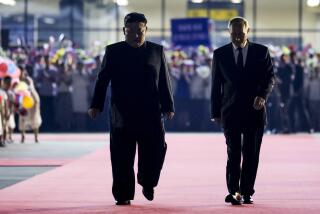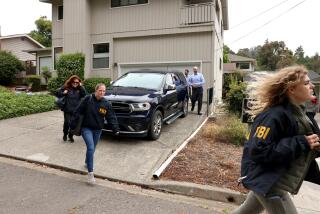Son of S. Korea Leader to Be Charged in Scandal
TOKYO — In a dramatic climax to South Korean President Kim Young Sam’s worst corruption scandal, prosecutors announced plans to arrest his son today on charges of influence-peddling in exchange for millions of dollars in bribes from leading businesses.
South Korean media reported that prosecutors had acquired evidence that Kim Hyon Chol, known as the “Crown Prince,” took as much as $3.5 million in bribes, including $349,000 from Dooyang Business Group Chairman Kim Dok Young, in exchange for help in regaining ownership of a financial firm. Kim Hyon Chol, who has been under questioning since Thursday, has denied the bribery charges and said the money was “donations.”
Prosecutors have not yet disclosed any evidence that Kim Hyon Chol was the shadowy figure who directed that nearly $6 billion in questionable loans be made to the ailing Hanbo Iron & Steel Co., which collapsed in January. So far, 11 people have been arrested in connection with the scandal, but critics charge that only a powerful political figure such as Kim Hyon Chol could have ordered bank chiefs to make the loans to the tottering enterprise.
The arrest of Kim Hyon Chol, who managed his father’s 1992 campaign, could set off a massive political crisis if it is established that the president himself condoned the alleged corruption or supplied his son with the $14-million slush fund prosecutors say they have uncovered.
If those funds were illegally transferred from former President Roh Tae Woo and secretly used to fund President Kim’s 1992 campaign, as some charge, the president himself could face criminal charges--becoming South Korea’s third president in a row to fall to corruption. Last year, Roh and Chun Doo Hwan were convicted of bribery--as well as separate charges stemming from the bloody suppression of a 1980 citizens’ uprising in Kwangju--and are serving prison sentences.
But most analysts believe that the public has no stomach for such political instability amid a deepening economic crisis and growing turmoil in North Korea, and will settle for a presidential apology. A poll by Munhwa Broadcast Corp. found 9% of people surveyed supported Kim’s resignation.
Despite Kim’s shortcomings, he unquestionably helped advance South Korea’s fledgling democracy as the first civilian president in more than three decades of repressive military rule, said Han Sang Jin, a Seoul National University professor of political sociology.
“We have a terrible history, and if we prosecute [Kim], it will shake the foundation of legitimate political power,” Han said. “It’s too much.”
South Korea’s major opposition leaders--Kim Dae Jung and Kim Jong Pil--don’t particularly desire Kim’s resignation, either, since it might increase pressure for them to step down, said Choi Jang Jip, Korea University political science professor.
*
But the arrest of Kim Hyon Chol--who has long been suspected of wielding strong but shadowy influence in everything from political appointments and business licenses to bank loans and national policy--will effectively shatter President Kim’s image as a clean-government crusader bent on curing what he called the “Korean disease” of corruption, analysts said.
Inaugurated in 1993 on public approval ratings surpassing 90%, President Kim jailed hundreds of officials for corruption and enacted new laws on political reform and financial disclosure. But the opposition United Liberal Democratic party charged that the president introduced the real-name transaction law, which ended the safe haven of bogus names on bank accounts, only after his son had safely stashed away his slush fund.
The demise of Kim Hyon Chol, 37, came with stunning speed.
The scandal began to unravel when Hanbo--one of South Korea’s leading steel mills--declared bankruptcy in January, and Kim Hyon Chol’s name began openly appearing in South Korean media as the prime suspect in the scandal.
In an investigation denounced as a whitewash, however, prosecutors declined to question Kim Hyon Chol as a suspect, declaring a lack of evidence. But that changed in March, when a friend of his released a videotape showing Kim Hyon Chol discussing political appointments with a senior presidential aide.
As public pressure for Kim Hyon Chol’s head mounted, prosecutors changed the investigative team and obtained the confession from Dooyang’s Kim Dok Young that he had bribed the president’s son.
Meanwhile, on Friday, two of Kim Hyon Chol’s business associates were indicted on fraud, bribery and other charges. Park Tae Joong and Kim Hi Chan were arrested this month after prosecutors accused them of taking bribes in return for promises to lobby Kim Hyon Chol for help in obtaining broadcast licenses.
More to Read
Sign up for Essential California
The most important California stories and recommendations in your inbox every morning.
You may occasionally receive promotional content from the Los Angeles Times.











